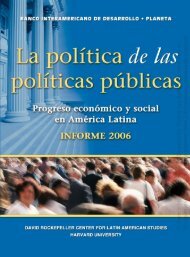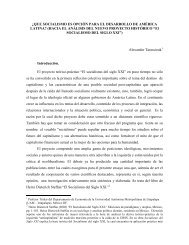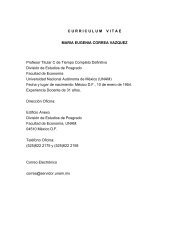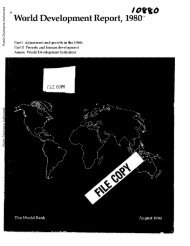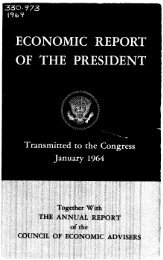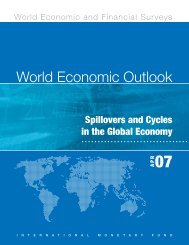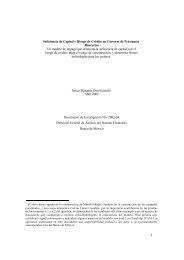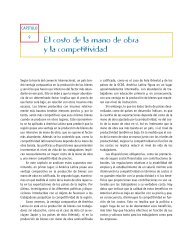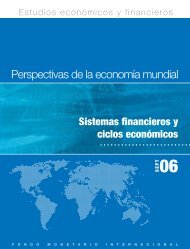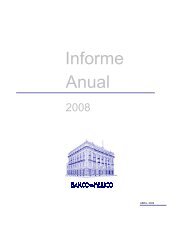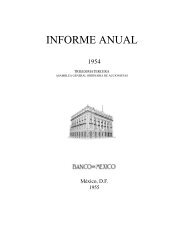World Bank Document
World Bank Document
World Bank Document
You also want an ePaper? Increase the reach of your titles
YUMPU automatically turns print PDFs into web optimized ePapers that Google loves.
Table 5.1 A taxonomy of external borrowing controls<br />
Borrowers Range of controls Country examples<br />
Central government Tight control within overall statutory ceilings. Thailand, Philippines,<br />
Brazil.<br />
Government departments permitted reasonable freedom within Most countries.<br />
loose overall borrowing controls.<br />
Public enterprises and All borrowing must be initiated by and undertaken by the central Indonesia.<br />
local governments government.<br />
Borrowing must be authorized by the central government.<br />
Mexico, Ecuador, Korea,<br />
Portugal, Brazil.<br />
No controls unless government guarantee requested.<br />
Sudan.<br />
Local authorities permitted to borrow freely.<br />
Yugoslavia (pre-1982),<br />
Nigeria (pre-1982).<br />
Commercial banks Selective restrictions on foreigrn borrowing. Brazil, Korea.<br />
Freedom to borrow and lend in any currency and to incur exchange Chile, Ecuador,<br />
risks.<br />
Argentina (pre-1982).<br />
Private (nonbank) Borrowing must be approved; minimum maturity and maximum Turkey, Costa Rica,<br />
borrowers interest rate stipulated. Philippines, Brazil,<br />
Korea.<br />
Borrowing must be approved an-d is often required for capital<br />
Portugal.<br />
goods imports over a certain level.<br />
Borrowing must be registered, but is almost always approved.<br />
Thailand, Mexico,<br />
Ecuador.<br />
No controls or accurate measurement.<br />
Indonesia.<br />
Source: <strong>World</strong> <strong>Bank</strong> informal survey.<br />
enterprises. For example, following the PER- cate the management of overall public debt. Fol-<br />
TAMINA crisis in the mid-1970s, the Indonesian lowing recent difficulties, the government of<br />
government prohibited most public enterprises Yugoslavia has coordinated all the foreign debts of<br />
from borrowing abroad; public enterprise debt is the regions.<br />
now generally indistinguishable from central gov- Control over foreign borrowing by the private<br />
ernment debt.<br />
sector varies greatly (see Table 5.2). Until recently,<br />
It is common practice for governments to guar- some developing countries sought to encourage<br />
antee foreign loans made to public enterprises and private companies to borrow abroad. In Argentina<br />
even to the private sector (sometimes for a fee, as and Mexico in 1981 and 1982, governments urged<br />
in Pakistan). The potential advantages of a guaran- large corporations to get foreign loans so as to<br />
tee include better borrowing terms and greater make room in domestic financial markets for<br />
control over the investment programs of public increased public borrowing. Exchange rate guaranenterprises.<br />
But guarantees place an extra financial tees have also been a fairly common means of<br />
burden, potentially a large one, on the central gov- encouraging private borrowing, particularly in<br />
ernment. They also transfer part of the responsibil- Latin America. Asian governments have generally<br />
ity for project appraisal to the government, further not provided formal guarantees, though central<br />
stretching its scarce administrative capacity. And banks have sometimes offered a "swap" facility,<br />
by ensuring a dependence on the government, a which effectively achieves the same goal.<br />
guarantee policy may unintentionally stop public With the debt-servicing difficulties of the past<br />
enterprises from becoming more financially few years, governments have tightened their consophisticated<br />
and more accountable for their trols on foreign borrowing by the private sector. In<br />
actions.<br />
about half of the developing countries, private bor-<br />
In most developing countries, local or regional rowers need permission from the government. A<br />
authorities are not permitted to borrow abroad few governments-including those in Brazil,<br />
independently of the central government. There Korea, and the Philippines-have used their<br />
have been a few exceptions, in federal states such powers actively to control the level and composias<br />
Nigeria and Yugoslavia. But autonomous bor- tion of total debt. Costa Rica and Turkey are two<br />
rowing by local government can seriously compli- countries that have recently begun to control pri-<br />
74



